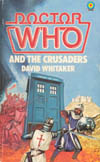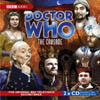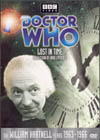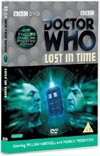The Crusade
|
(Doctor Who Story No. 14, starring William Hartnell)
- written by David Whitaker
- directed by Douglas Camfield
- produced by Verity Lambert
- music by Dudley Simpson
- 4 episodes @ 25 minutes each:
| 1. |
| The Lion |
| 2. |
| The Knight of Jaffa |
| 3. |
| The Wheel of Fortune |
| 4. |
| The Warlords |
Story: Landing in the midst of the historical
conflict of the Crusades, Barbara is captured by Saracen
warriors, prompting Ian to lead a noble rescue attempt.
Meanwhile, the Doctor and Vicki become ever more entangled
in a web of court intrigue involving
King Richard the Lionheart (Julian Glover)
and his sister Joanna (Jean Marsh).
|
|
The DVD's include:
- Two complete original episodes: #1: The Lion and
#3: The Wheel of Fortune.
- Audio only of the missing episodes #2: The Knight of Jaffa, and
#4: The Warlords (both without narration)
- optional Episode 3 audio commentary by
actor Julian Glover (King Richard)
and moderator Gary Russell.
- "Who's Who" text screen cast biographies (may be on Region 1 discs only)
- The "Play All" function will also activate special links
from the VHS version,
filmed with William Russell in character as
Sir Ian Chesterton.
More details & buying options for "Lost in Time" DVD's
and missing episode VHS videos
Buyers' Guide Review
by Martin Izsak
|
|
(A more in-depth analysis, containing "SPOILERS" and intended
for those who have already seen the program, can be accessed
here.)
|
For many years, fans' level of appreciation for this story
was derived chiefly from its novelization, whose reworked
structure and altered dialogue weakened considerably more
in the adventure than it improved. Then, episode three became
popular as part of
"The Hartnell Years" video release,
hinting at greater things from the television version.
Now, the much more recent release of the newly re-discovered
first episode of this story, along with the rest of the soundtrack
to complete it, sheds some welcome new light on this classic tale,
enhancing its status in several ways. Season Two has only two
"purely historical" stories, and for the second time, this very
type of story features a strong script, full of dramatically
meaty scenes.

|
|
To start with, let's examine the problems with the
novelization. The first scene in the TARDIS allows the age old
"historical non-interference" issue to rear its ugly head once
more, as Ian asks why it doesn't apply to the future or
to other planets. (It does apply, as the next story will
demonstrate, but in terms of the tendencies of the series'
writers, it's a very good question). David Whitaker writes
a ton of flowery dialogue on the subject which does
absolutely nothing to justify such a ridiculous stance,
but merely to "romanticize" it. Fair enough, because what
this scene does do, rather well in fact, is to establish the
four travellers' goals for their next Time-Space location.
They wish to observe and study and learn philosophically
from two men who are both right in their own way, who
fight each other for the best possible reasons. The
travellers needn't be heroes or solve the locals' problems.
|
That done, the TARDIS seems to think that they have hit
upon an excellent idea, and promptly lands them in the thick
of Lionheart King Richard the 1st's crude Christian crusade against
the Saracen leader Saladin and his hordes of Turkish Muslims.
Apparently these opposing leaders are our two men who are both
right.
The plot digresses predictably, however, as Barbara barely
steps out of the TARDIS before she is captured by a rogue
Saracen captain who is not right in any sense about anything.
Fully half of the plot will now revolve around a pure villain,
which violates this story's well-advertised mission statement
a little too much for my tastes.
We move back to the rusty old
rescue and escape routines, replacing honesty with deception
as desperation mounts. Even with such unimaginative plot
devices, our first rate writer manages to provide something
of a definitive version of all this and make the proceedings
among the most interesting of all season two Doctor Who stories.
Despite lots of earlier good stuff, the novel completely forgets
where it was headed, not doing justice
to either the Doctor's heroics or the story's own stated
mission statement.
Any attempt to use the book to figure out what happened in the
missing episode four becomes sorely disappointing.
Gone are most of the characters that made
episode three such a gripping drama: Julian Glover's magnificent
King Richard, Jean Marsh's fiery and radiant Joanna, Bernard Kay's
thoughtful, decent Saladin, along with his amorous brother
Saphadin. They simply don't appear. One can't learn from
two men who are both right, or four people for that matter,
if they are all missing.
Most disappointing.
The book glosses over far too much good stuff
in a last minute flashback, as the story is restructured
terribly to remove the Doctor's presence almost entirely from
the final third of the book.
Thus the Doctor as well appears to have abandoned the
story.
Instead Barbara's later contributions are chronicled,
followed by an overdose of Sir Ian Chesterton,
coming to the rescue. It's all quite predictable,
and centered on the more thin and cardboard-like of this story's
guest characters.
Major snore!
As a hero, the first Doctor is a hurting unit once more after
the novelization is finished with him. The story appears here to be
a great idea with an exceptional lead-up, but little idea of where
it was really going. This definitive collection of the worst of
early Doctor Who clichés is a disappointment, and being one of
the very first Doctor Who stories to be novelized, the book probably
did much to turn fans off of the historical stories that were
so prolific in the early years.
|
Well, luckily episode four's resemblance to a bland
clichéd dud is confined to the novel. The surviving soundtrack
proves otherwise where the television version was concerned.
Let the heavens open, and light be cast on the rest of "The
Crusade" at last.
|

|

|
|
"William" Russell Enoch returns to reprise his role of
Sir Ian Chesterton for the first time in over 30 years,
a superb choice for linking material as his character's
knighthood is easily the most interesting lasting impression
that this story has on the series. This is recognized
and played to right from the beginning - good call.
Mention of the talking stones of the planet Tyron has
been lifted straight out of the novelization, which the
authors of the linking material favor a little too much
over the soundtracks - and Sir Ian's recap of episode four
remains as disappointing as the book. Thankfully, any one
who sees this will also have access to the real thing on CD.
Or DVD audio. Be sure to listen to it!
|
|

|
Episode One - The Lion
The first most notable difference from the novel is the
total absence of any scene in the TARDIS. This time, we
are not set up to unsuccessfully argue time travel
non-interference ethics, or try to learn from characters
we are too afraid to interact with. We delve straight
into the forest. Julian Glover's performance is good from
the start, but too easily upstaged by a host of less
interesting minor characters. Although the confusion
surrounding the King's identity is a major ingredient
in the later drama of this episode, it takes much away from
the opening scenes by helping to confuse the audience as well.
The action scenes work, and are a study in themselves on
how to make cheap, low budget, safe fighting scenes remain
as surprising and emotionally effective as possible, but it
could have gone up yet another notch from the script's point
of view if we could be rooting for some of the guest characters
after having them better established.
|
The TARDIS arrives in the midst of the shenanigans
with a good visual materialization, proving that not a
single season two story cut corners on this introductory
effect. Although sometimes the usual sound effect is
missing, this is the only instance I know of where it
has been REPLACED by a totally different style of effect in
the television episodes. It's weird and without explanation
of any kind, but also unique. Okay, I'll buy it.
(It's actually the very end of the "TARDIS computer" sound effect,
available as track 8 on the audio CD
"Doctor Who at the Radiophonic Workshop, Volume 1: The Early Years".)
The introduction of the TARDIS still leaves much to be desired,
as we immediately cut away from the police box, and return
to it to see our travellers gathered nearby with vacant
expressions on their faces, while the Doctor finishes
locking the door. The idea that they travelled in it
and just came out is not established well enough for
first time viewers of the series, especially as they don't
have much of anything to say to demonstrate their backgrounds
either, and before you know it, an uncharacteristically quiet
Barbara is captured and the old routines begin. All this
haphazard action serves its purpose though, in capturing
viewer attention and setting up the drama that follows.
|
Sound Effects by Brian Hodgson
"TARDIS computer"
is available on:
 |
Audio CD -
Doctor Who at the BBC Radiophonic Workshop
- Volume 1: The Early Years 1963-1969
Find out more here.
|
|
|
The brothers Saladin and Saphadin get themselves superbly
introduced here, and at last Barbara is allowed to show the
strengths of her character.
The Doctor's antics later on
are a joy to watch, and Vicki is put to good use as his accomplice.
At last we know how the TARDIS's huge wardrobe became so nicely
stocked!
Before the episode is over, King Richard also gets his due,
as does his entire life's situation,
nicely informing any audience members that might not be
acquainted with this period of history.
Episode Two - The Knight of Jaffa
The story's structure continues to prove much better on television
than in the novel, with a few subplots confined to this episode
alone. Some of the Doctor's arguments
make less sense and less good humour
here than in the novel though. Vicki is done justice all
throughout the television version, despite the novel practically
forgetting about her altogether and making me suspect Maureen
O'Brien might have taken a holiday for an episode.
Episode Three - The Wheel of Fortune
This episode works even better than before when surrounded by the
rest of the story once again. The clothing shop keeper Ben Daheer
easily stands out better now, his character much more
understandable.
Douglas Camfield made a classic out of his first full story
as a director, and episode three contains what is probably the
finest bit of acting in the entire season.
Julian Glover (King Richard) is also known for
playing the villain Scaroth in
"City of Death" (story no. 105),
the capable commander of the Imperial Walker attack on Hoth
known as General Veers in "Star Wars V: The Empire Strikes
Back", and as the key character Donovan in "Indiana Jones and
The Last Crusade". Jean Marsh (the King's sister Joanna) went
on to play single-story companion Sara Kingdom in
"The Dalek Masterplan"
(story no. 21, also directed by Camfield), and later returned to
Doctor Who to play Queen Morgana in
"Battlefield" (story no. 156).
She also played similar evil witch villains in "Return to Oz" and
"Willow". Taking all that into account, Doctor Who's
"The Crusade" is still the finest moment for both of
those actors, and
William Hartnell turns in one of his finest performances
as the Doctor finds himself caught between them.
This moment is not to be
missed by any serious fan of the show.
Indeed, the whole episode is well done, also featuring
a solid performance from Doctor Who veteran Bernard Kay
as Saladin. Kay had appeared as Tyler in
"The Dalek Invasion of Earth"
(his performance is much more inspired here) and would
go on to play Inspector Crossland in
"The Faceless Ones" (story no. 35) and
a conscientious miner in
"Colony in Space" (story no. 58).
He can also be seen in David Lean's epic film "Doctor Zhivago".
All this
acting talent does not go to waste, as director Douglas Camfield
encourages each performer to give his or her best, and captures
it masterfully on videotape with angles that draw the viewer
right into the depths of each character's emotions and
motivations. Beautiful!
Another item to note is that this story actually features
Douglas Camfield and musical composer Dudley Simpson working
together. It would not happen again on Doctor Who, as soon after
they got into an argument at a dinner party and Camfield refused
to use Simpson ever again. However, Simpson has undoubtedly
written his best season two score here for this story, and I
suspect the Camfield influence deserves some of the credit.
The music fits the story's darker moods like a glove (and it
is mostly during dark, moody bits that the Doctor Who program
requires music).
Episode Four - The Warlords
Redemption at last! Contrary to the poor excuse for a
novelization, King Richard does appear in the final episode
of "The Crusade", and his scene with the Doctor makes an
enormously important contribution to understanding,
enjoying, and completing the story.
Thus, the most important need set up
in the television version finds resolution. Nice.
Also, we are spared an overdose of Sir Ian, as the restraints
of time and budget do not provide for excess traveling scenes.
Can you say "harem"? Nobody in "The Crusade" can, preferring the
pronunciation "harEEm" for reasons I don't understand. I prefer
something closer to the Hungarian word "három" which means three,
and which probably has a common origin with "harem".
We are given a comic relief character
who manages to get fully developed in just one episode.
He is hard to like at first, but give him time.
The actor throws a lot into this part, and
it's all been planned much better than you may at first guess.
I'll save the rest of my comments on the story's conclusion
for the
in-depth analysis version
of this review. Come back and read it after you've
listened to the final episode.
Excellently done all around! I think I still prefer
"The Rescue" (story no. 11),
as it has a greater moral point, a clearer
involvement of the Doctor in the right concluding beats,
and it being a sci-fi with
more atmospheric music, but "The Crusade" is now a much more
serious contender for season two's top ranking position.
This story is not known to exist in its original format
(4 black-and-white 25-minute TV episodes) in its entirety.
 |
Doctor Who: Lost in Time - William Hartnell
1 DVD disc
(also included in Lost in Time Boxed Sets) |
Coverage on The Crusade includes:
- Two complete episodes:
- Episode 1: The Lion
- Episode 3: The Wheel of Fortune
- Episode 3 audio commentary by
actor Julian Glover (King Richard)
and moderator Gary Russell.
- Original television episode audio from:
- Episode 2: The Knight of Jaffa (no narration)
- Episode 4: The Warlords (no narration)
- introduction and links for "The Crusade"
by William Russell
in character as Sir Ian Chesterton.
More details & buying options for "Lost in Time" DVD's
 |
Doctor Who: The Crusade / The Space Museum
introduced by William Russell
as Sir Ian Chesterton
1 VHS video tape & 1 audio CD |
VHS / audio CD coverage on The Crusade includes:
- Two complete episodes:
- Episode 1: The Lion
- Episode 3: The Wheel of Fortune
- Original television episode audio on CD from:
- Episode 2: The Knight of Jaffa (no narration)
- Episode 4: The Warlords (no narration)
- introduction and links for "The Crusade"
by William Russell
in character as Sir Ian Chesterton.
- bundled with the next story:
"The Space Museum",
also on VHS video tape.
- credits for William Russell's linking sequences.
More details & buying options for missing episode VHS videos
Comments on this article are welcome. You may contact
the author from this page:
Contact page
|









